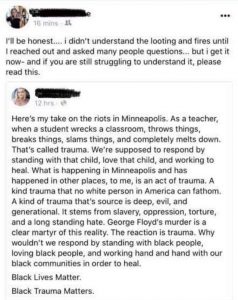A few years ago, as I completed the journey toward ordination we had to take a series of vows that affirmed our position within the denomination. One of those positions was that of the infallibility of the Scriptures—meaning that they are without error.
Normally, such people are called inerrantists. While I happily said the vows, I hesitate to define myself as such. I believe the Scriptures are true, trustworthy, and authoritative for the Christian. However, I have deep reservations about defining myself by what I’m not, rather than what I am.
Human beings have a pernicious tendency to become the very things we set ourselves against.
A while back I had a conversation with a strong inerrantist, who in seeking to harmonize the text, abused the text. At some level, wanting to preserve the idea of what the Scriptures are not, he didn’t allow them to speak as they are. To preserve his idea of inerrancy, he denied their authority.
The problem of defining ourselves by what we are not is the tendency to become the very thing we set ourselves against.
Antimovements
Over the past few weeks, we’ve seen this tendency of antimovements manifest in many ways.
Antifa
Antifa (short for anti-fascist) is more fascistic than those they set themselves against. Fascism uses force to suppress opposition in order to gain control. Antifa is purposefully violent against their political opponents in order to instill fear.
In Seattle, Antifa has created their own space. Although they rail against the police, their “People’s Force” is more authoritarian, implementing their own version of stop and frisk and holding hostages (as the populace did not vote them in to control this neighborhood).
Antiracist
The term “antiracist” is growing in popularity, but I fear the same thing is happening.
 Perhaps the most racist post I’ve seen is this one. She talks of her experience as a teacher that when children throw, break, slam things, and melt down that we recognize it as trauma manifesting. Compassion and love, rather than discipline, is required.
Perhaps the most racist post I’ve seen is this one. She talks of her experience as a teacher that when children throw, break, slam things, and melt down that we recognize it as trauma manifesting. Compassion and love, rather than discipline, is required.
I know she may have been well intentioned but let’s be clear…black people are not children. Their children are of course children but as a class of people they are not children. I have no doubt that if one of this teacher’s peers acted in a similar manner, she would be horrified and want the teacher fired. Why? Because adults have agency and the expectation to control their emotions.
I suspect this teacher and the few people I saw post such nonsense have very little encounters with black people. As a class of people, black people are not weak, fragile children, needing to be coddled. They don’t lack strength, agency, or the ability to make wise decisions.
In trying to be antiracist, she becomes the very thing she stands against.
A mob has formed against a UCLA professor for not giving students special consideration according to their race, in accordance with federal law. The school has put him on leave, despite acting according to school policy.
In seeking to be antiracist, they became the very thing they hate.
So What am I?
While I’ll say I’m against racism, I won’t call myself an “antiracist.” I will call myself a dignitist— believing all people are worthy of a level of respect and dignity as made in God’s image. I am a justice-seeker—wanting to see justice accomplished within all levels of society.
Of course the antiracists will say, “Yes, we do too.” But again, when the target is to be against racism rather than for dignity and justice, our pursuits often devolve into supporting injustice and undignified treatment of others.
We see NYT columnists telling readers to cut off family if they don’t go to a rally or donate to an approved cause. “Sorry grandma, I know COVID-19 may kill you but you need to come with this mob if you want to see your grandkids.” We see murals of lynched policemen graffitied on walls.
When we identify ourselves by what we aren’t, our hearts will justify the most wretched aspects of who we are.
I don’t want to set up a weak man and suggest that all antiracists would endorse such nonsense. I would caution us about the nature of the human heart. When we identify ourselves by what we aren’t, our hearts will justify the most wretched aspects of who we are.
We mutter “the enemy of my enemy is my friend,” as we make unholy alliances. My great fear for our society is that in fighting a good cause we’ll wake up having become twice the tyrant we sought to dethrone.
May it never be.
- Hospitality in a Covid World - December 17, 2020
- Jesus, the Liberator We Don’t Want - June 12, 2020
- Why I’m NOT an Inerrantist - June 11, 2020



